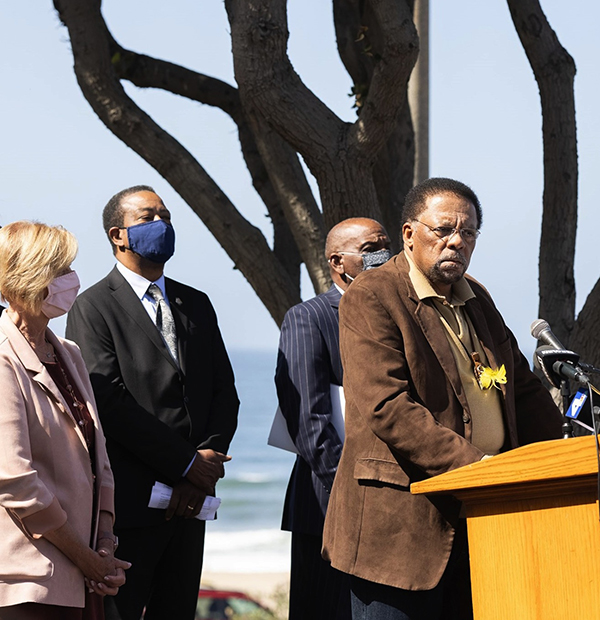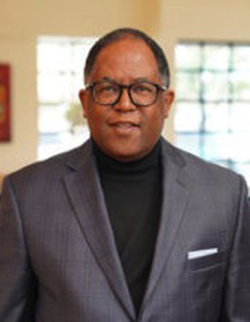State hosts symposium to connect small businesses with billions in contracts

By Antonio Ray Harvey
Contributing Writer
SACRAMENTO — Despite the state’s looming budget deficit, Secretary of Transportation Toks Omishakin shared some upbeat news during the first-ever Small Business Symposium held virtually on June 5.
Omishakin said the “sun is shining on us” referring to small business owners and the commitment of the state and federal governments to continue making investments in the sector to expand opportunities.
“The state budget has challenges,” Omishakin said. “Nevertheless, this is still the most fruitful period of transportation investments in California and America. It’s time for us to take advantage of the fact that we have the policies and the funding to help small businesses in the state.”
So far, the state has received over $42 billion in Infrastructure Investment and Jobs Act funds from the Biden administration in almost three years, including more than $29 billion for transportation-related projects.
State officials, including Tara Lynn Gray, director of the California Office of the Small Business Advocate, other stakeholders, and more than 400 other participants attended the three-hour webinar.
Recent transportation-focused infusions of cash into the California economy include almost $430 million from the Infrastructure Investment and Jobs Act and an additional $740 million from Senate Bill 1, the Road Repair and Accountability Act of 2017 authored by retired state Sen. Jim Beall, D-San Jose.
Omishakin explained the progress of small businesses’ participation in Caltrans state and federal contracts and how they relate to Assembly Bill 2019, a law signed in 2022 that made the procurement process more inclusive and equitable, and facilitated more funding toward small businesses.
In the fiscal year 2022-23, more than $961 million was awarded to small businesses in California. The participation goal, as mandated by AB 2019, was 25% but the state surpassed that mark by 9.4%.
According to the governor’s office, federal contracts awarded to disadvantaged business enterprises in the state exceeded the targeted requirement as well. Disadvantaged business enterprises were awarded more than $1 billion in federal contracts during the 2022-23 fiscal year, amounting to 22.3%. The required target was 22.2%
AB 2019 was co-authored by Assemblywoman Cottie Petrie-Norris, D-Irvine, and Assemblyman Chris Holden D-Pasadena. It codifies a 25% small business goal for state procurement and enhances the ability of state agencies to include small and underserved businesses in state contracting.
“In 2018-19, when Gov. Gavin Newsom was elected, $503 million in contracts were awarded to small businesses. The goal was 17.5% but we passed it with 17.6%,” Omishakin said. “In 2022-23, it was the first time in the history of this program it exceeded $1 billion going to [disadvantaged business enterprises]. These programs combined, state and federal, were north of $2 billion in small business and [disadvantaged business enterprises] just from Caltrans.”
“Now that’s a whole lot of money and a lot of opportunities for people to continue doing work with the state,” he added.
With the theme, “Scaling to New Heights Through Contracting Opportunities,” the symposium featured representatives from state agencies and departments discussing opportunities available for small businesses interested in working with the state.
The symposium was hosted by the California Governor’s Office of Business and Economic Development, the California Government Operations Agency, and the California State Transportation Agency.
The event included updates from the directors and department executives at the California Department of Transportation, California High-Speed Rail Authority, California Department of General Services, California Office of the Small Business Advocate and the California Department of Technology.
“We’ve never had a gathering like this before on small business where all the top leaders in state government participated,” Omishakin said. “The entire team worked hard to get the word out.”
The leaders of the entities were also available to answer questions, provide guidance on requirements to qualify and share tips for accessing resources.
Dee Dee Myers, the director of the Governor’s Office of Business and Economic Development, said the state has 4.1 million small businesses with a workforce of 7.1 million employees.
“California is the largest, most diverse small business community in the country,” Myers said. “That’s a million more than the next state which happens to be Texas. Ninety-nine percent of our businesses meet the SBA definition of small business, which means having fewer than 500 employees. Ninety-eight percent have fewer than 20 employees.”
The chief of California High Speed Rail Authority Catrina Blair provided an overview of participation for 844 certified small businesses and 29 disadvantaged business enterprises from out of the state working on a 171-mile project that expects to build out around 800 miles with 24 stations.
Phase 1 of the future electrified high-speed rail will start its excursion from San Francisco to the Los Angeles basin in under three hours, surpassing speeds of 200 miles per hour. Blair said that the High Speed Rail Authority provides contracting goals and opportunities for small businesses, disadvantaged business enterprises and disabled veterans enterprises.
“The High Speed Rail has many moving parts and announcements are released regularly about progress on our social media accounts,” Blair said. “Additionally, reading our project update report and business plan is the best way to stay informed about our specific details and project status.”
Omishakin explained that the impetus to organize the symposium with state leaders and the business community came when he was a keynote speaker at the California African American Chamber of Commerce’s second annual State of California African American Economy Summit in Los Angeles in January.
“Attendees brought up the fact that they didn’t know where the dollars are, how much money was coming in, or where opportunities lie,” Omishakin said. “I told them, ‘You will hear back from me as a state together. Not just me but the rest of the team that works for Gov. Gavin Newsom.’”
Antonio Ray Harvey is a reporter for California Black Media.





